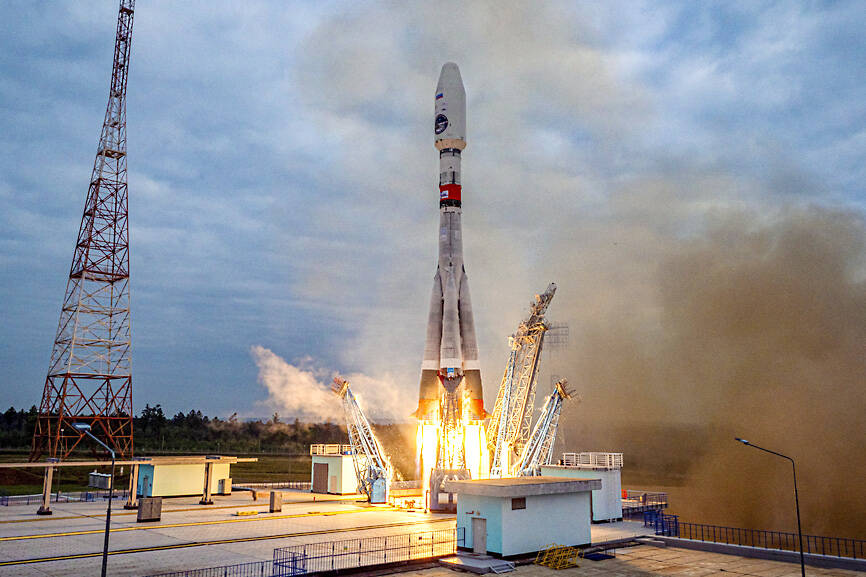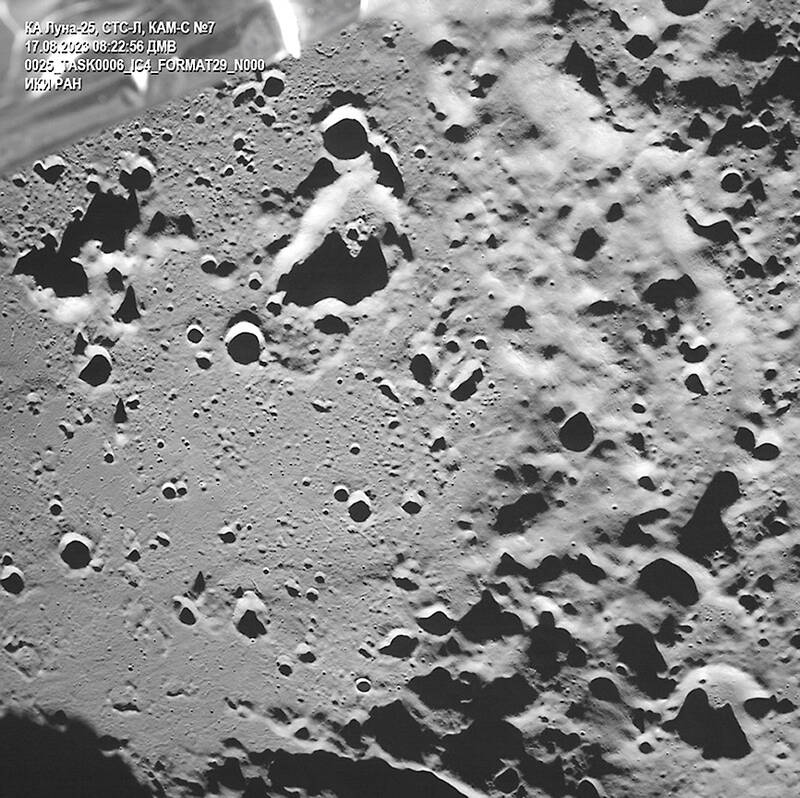The crash of Russia’s Luna-25 spacecraft into the moon over the weekend is not just a setback for Russian President Vladimir Putin’s ambitions to overcome war-related sanctions. It is also an embarrassment for Chinese President Xi Jinping (習近平) — Putin’s partner in building a proposed base on the moon meant to challenge the US and its space allies.
The Russian spacecraft was aiming to be the first to land near the south pole, the intended location of a joint base that space agencies in China and Russia announced in 2021 they had agreed to build together.
Wu Yanhua (吳艷華), the chief designer of China’s major deep space exploration project, led a delegation to the Vostochny Cosmodrome in Russia’s far east to attend the launch and discuss deepening cooperation between the two countries’ space programs, Chinese media reported earlier this month.

Photo: AP
Now that the mission has ended in failure, Chinese media reports on the crash have been far and few between, with Xinhua news agency only carrying a terse five-sentence missive on Sunday.
“This failure is expected to deal a blow to Russia’s ambitions,” Hu Xijin (胡錫進), the former editor of the Chinese Communist Party-controlled Global Times, wrote in an opinion piece for the newspaper, while adding that “the West should not underestimate Russia just because its lunar program has failed.”
Luna-25 was the first Russian spacecraft to attempt a moon landing since the end of the Soviet Union.

Photo: AP
“We will have to learn everything again,” space historian Alexander Zheleznyakov told privately owned Russian media group RBC. “We must learn how to confidently fly to the moon, land confidently on its surface, and only after that proceed with the implementation of grandiose plans alone, either with China or with other countries.”
Russia’s space program has stagnated because of corruption, mismanagement and sanctions, said Bruce McClintock, lead of the RAND Space Enterprise Initiative and a senior policy researcher at the RAND Corp.
“For Russia, this is really bad,” he said. “This was their long-awaited, near-last chance to regain any credibility when it comes to outer space exploration.”
Since the invasion of Ukraine in February last year, Chinese media have downplayed Russia’s role in the lunar base.
Unlike Russia, China succeeded with its own attempt to beat others to the moon when it became the first country to land a spacecraft on the far side of the astronomical body in 2019. More than four years later, that mission’s Yutu-2 lunar rover remains active.
Behind the scenes, China already recognizes that Russia is of limited value as a space partner, said Pavel Luzin, a senior fellow with the Jamestown Foundation and a researcher on space policy.
“China is not interested in cooperating with Russia, because Russia can provide nothing to China,” he said.
While the Russians had intended on synchronizing their lunar missions with the Chinese ones to utilize resources more efficiently as the two nations worked toward establishing their join base at the moon’s south pole, that is no longer an option, Luzin said.
“There was an opportunity for synchronization, but currently it’s just impossible,” Luzin said.
Russia’s crash provides an opening for China’s biggest Asian rival, India, which now has the chance to be the first to land at the lunar south pole. India’s Chandrayaan-3, launched last month, is to attempt a landing as early as tomorrow.
Success would be a stark sign of the change in fortunes of the Russian and Indian space programs, as it was not that long ago that New Delhi was depending on taking part in the Luna program as its best way to get to the moon, McClintock said.
However, China is not about to give up on all forms of cooperation in space with Russia, as Moscow could be of help in developing space-based missile early warning systems, said Mark Hilborne, a lecturer in the Defence Studies Department at King’s College London.
However, in the more public areas of space exploration, “China may at least outwardly emphasize its collaboration with Russia to a lesser extent, partially due to international opprobrium over Ukraine and its recent lunar failure,” he said.

A fire caused by a burst gas pipe yesterday spread to several homes and sent a fireball soaring into the sky outside Malaysia’s largest city, injuring more than 100 people. The towering inferno near a gas station in Putra Heights outside Kuala Lumpur was visible for kilometers and lasted for several hours. It happened during a public holiday as Muslims, who are the majority in Malaysia, celebrate the second day of Eid al-Fitr. National oil company Petronas said the fire started at one of its gas pipelines at 8:10am and the affected pipeline was later isolated. Disaster management officials said shutting the

US Vice President J.D. Vance on Friday accused Denmark of not having done enough to protect Greenland, when he visited the strategically placed and resource-rich Danish territory coveted by US President Donald Trump. Vance made his comment during a trip to the Pituffik Space Base in northwestern Greenland, a visit viewed by Copenhagen and Nuuk as a provocation. “Our message to Denmark is very simple: You have not done a good job by the people of Greenland,” Vance told a news conference. “You have under-invested in the people of Greenland, and you have under-invested in the security architecture of this

UNREST: The authorities in Turkey arrested 13 Turkish journalists in five days, deported a BBC correspondent and on Thursday arrested a reporter from Sweden Waving flags and chanting slogans, many hundreds of thousands of anti-government demonstrators on Saturday rallied in Istanbul, Turkey, in defence of democracy after the arrest of Istanbul Mayor Ekrem Imamoglu which sparked Turkey’s worst street unrest in more than a decade. Under a cloudless blue sky, vast crowds gathered in Maltepe on the Asian side of Turkey’s biggest city on the eve of the Eid al-Fitr celebration which started yesterday, marking the end of Ramadan. Ozgur Ozel, chairman of the main opposition Republican People’s Party (CHP), which organized the rally, said there were 2.2 million people in the crowd, but

JOINT EFFORTS: The three countries have been strengthening an alliance and pressing efforts to bolster deterrence against Beijing’s assertiveness in the South China Sea The US, Japan and the Philippines on Friday staged joint naval drills to boost crisis readiness off a disputed South China Sea shoal as a Chinese military ship kept watch from a distance. The Chinese frigate attempted to get closer to the waters, where the warships and aircraft from the three allied countries were undertaking maneuvers off the Scarborough Shoal — also known as Huangyan Island (黃岩島) and claimed by Taiwan and China — in an unsettling moment but it was warned by a Philippine frigate by radio and kept away. “There was a time when they attempted to maneuver